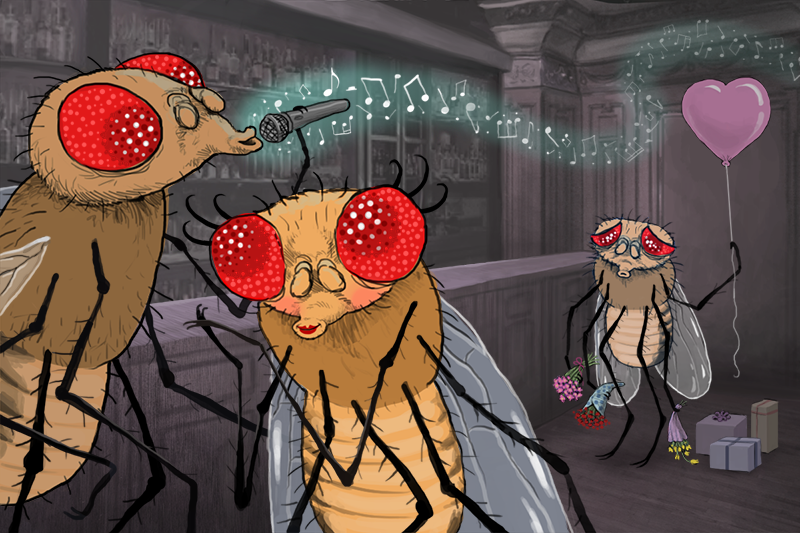The fruit fly’s guide to courtship: How the ‘bad boys’ beat the competition
 Illustration: Division of Research
Illustration: Division of Research
Fruit flies are savvier than you might expect – especially when it comes to the game of love. A rebuffed virgin male is quick to adapt if given another chance. He learns. He woos. He loves. Or at least he attempts a new and improved fruit fly version of love.
But are all experiences equally valuable for the fruit fly when it comes to learning? Recent research by Texas A&M University doctoral candidate Sehresh Saleem suggests that only positive sexual experience makes male fruit flies better at future reproductive attempts.
Saleem is ultimately interested in discovering if some flies are better learners than others. But first she needed to test whether these flies were even able to learn to improve their performance – if experience made them better at courtship and perhaps even copulation.
Previous research on the effects of prior social experience on future sexual behavior has primarily focused on negative social interactions, such as courtship conditioning, where the male is rebuffed by the female before he gets a chance to mate. Saleem and advisor Ginger Carney believe this approach misses a critical aspect of the evolution of behavior.
“Copulation is important for these males to complete,” Saleem said. “It results in a positive response in the males. It’s been shown that male fruit flies become less aggressive toward females after mating. It’s the act of mating that causes this change in behavior. Courtship alone doesn’t do it. So, there’s a key aspect of rewarded learning here that we’re not looking at.”
Fruit fly courtship consists of a sophisticated set of fixed behaviors that include the male following the female, tapping the female’s abdomen with his foreleg, unilateral wing extension and vibration (this vibration emits a sound called singing), and licking the female. The male will then attempt to mount the female for copulation by bending his abdomen towards her, and if she approves of his performance, copulation will commence.
To test the effect of sexual experience, Saleem and Carney divided males into two groups and gave them one of two levels of sexual experience: courtship of a receptive female but no copulation, or courtship with complete copulation. They placed these two types of males alone with a new female and recorded their courtship behavior. They then pitted the males of each type against each other in an arena to compete for the opportunity to copulate with a female and recorded the courtship behavior of each male and the experience level of the victor.
The researchers found that when males and females were placed alone together, experienced males (those that had already completed one copulation) spent less time courting new females than the naïve males did. These males also increased the frequency of abdominal bends towards the females. Essentially, they got right down to business.
#TAMUresearch

